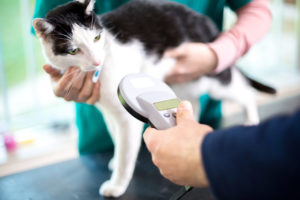
The lost pet microchip ID contains an identification number connecting the pet to its human owner.
Do you know how high your residential fencing is? Your pets are less likely to wander off when your backyard has a fence. Cats and dogs are intelligent animals that can figure out how to get around, over, or under the barriers you place in their path. Or they may be able to figure out how to unlatch the gate or push through one that was not closed tightly enough. This is why getting a lost pet microchip ID is essential for your pet.
How Do Pet Microchips Work?
Pet microchips are tiny, only the size of a single grain of rice. They use RFID technology to help detect lost pets. Specific models have anti-migration features to stay at the implantation site. The lost pet microchip ID contains an identification number connecting the pet to its human owner. This contact information enables animal shelters and veterinary hospitals to contact distraught pet parents. This part of the microchip process may be difficult without global chip scanners.
Understanding Frequencies
A lost pet microchip ID would only work with special frequencies. These frequencies are what makes these IDs “tick.” Even though it’s easy to assume that the chips release a constant signal, that is a misconception. The chip will remain dormant unless a scanner runs over it. The three most prevalent frequencies are the following:
- 125kHz chip – it was the most used model
- 134kHz chip – belongs to the International Standards Organization’s (ISO) code format
- 128kHz chip
Considering Microchip Frequency
The microchip won’t hurt your pet. However, you should know that frequency setting matters and sometimes won’t matter. “Universal scanners” can read the chips inserted under the animal’s skin. According to the American Veterinary Medical Association and American Animal Hospital Association agree that the 134kHz chip is the one you select for your pet’s chip.
Support Your Pet’s Wellness at Alexander Animal Hospital
Alexander Animal Hospital is a full-service animal hospital located in Severna Park, Maryland, serving the Severna Park, Pasadena, and Arnold Areas. Our goal is educating clients on the needs of their pets and understanding the importance of individualized veterinary care in order to strengthen the human-animal bond between owners and their pets.
We understand you have a choice when deciding on the care for your pets, and we strive to provide you with unparalleled services including wellness exams, vaccines, lost pet microchip ID, dental care, surgical services, digital radiography, and in-hospital laboratory services and diagnostics. Other highlights of Alexander Animal Hospital are the separate cat and dog waiting and exam rooms, as well as after-hours on-call emergency services.
Please take a look around our website and then give us a call at 410-777-8678 to set up an appointment. We’re social! Follow us on Facebook, Twitter, and Pinterest for all the latest updates!
